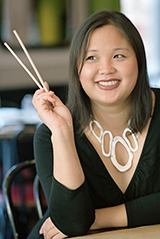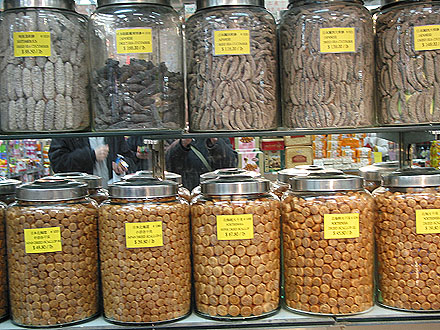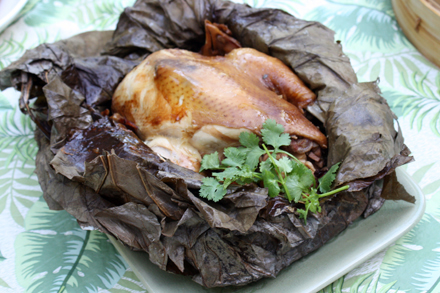
I routinely read Asian news reports on several Chinese language Web sites, and this Friday morning was no different. But on that morning as I read the alarming and ever expanding number of news reports on tainted Chinese dairy products, I started feeling a growing unease at my regular consumption of Chinese food products. After an announcement on September 21st by the Agri-Food and Veterinary Authority of Singapore that melamine was detected in the White Rabbit Creamy Candy from China, the candy was pulled off the shelves in many Asian markets. The Manufacturer finally announced a recall in China on Friday. As it happens White Rabbit Creamy Candy is one of my favorite candies. I’ve enjoyed them since my youth in Singapore and continue to purchase them here in New York’s Chinatown. After discarding my White Rabbit candies at home I wonder how I can keep my food supply safe.
I often marvel at the fact that I can go into an American supermarket and buy virtually anything on the shelves without concerns about threats to my personal health and safety. This was not the case when I was living in Shanghai a few years ago. Grocery shopping in China can be very stressful because of the constant doubt about the quality of the products you purchase.
I relied on a lot of ongoing discussions with other fellow expatriates as well as local Chinese friends for their knowledge of product safety. Unlike in America, where the press is free to report on food contamination, it is well known that the controlled Chinese media does not have this ability. Most people rely on word of mouth to learn which food products to avoid. For those without contacts to local authorities or political connections, the quality of the information passed on informally is always questionable.
Ultimately I developed a rather complex strategy for grocery shopping. My strategy is to rank different product by their sources. The safest most reliable products are usually foreign groceries imported into China. I would include Chinese sauces and condiments produced in Hong Kong, Taiwan or Singapore in this same ranking. Imported products at many American or European operated supermarkets in Shanghai are just as diverse as in any New York or Paris markets. Unfortunately, they also come at a premium price.
My second line of defense was to buy products made in China under a foreign brand. The reasoning is that in order to protect their brand franchise, and justify a higher price, foreign companies will have higher production standards and stricter quality control. The flaw in this assumption is that the ingredients supplied to these manufacturers are sourced locally. And that’s where the contamination originates. Only last week the Hong Kong authority found melamine contamination in the Nestle Dairy Farm Pure Milk product. Even purchasing these products does not guarantee safety.
I often found myself using strategies that my American neighbors in Harlem practice, which is to buy food that has been processed as little as possible. Often though I did not have the luxury of time to prepare everything from scratch. In America one might also try to “eat locally”, but in Shanghai that was not exactly advisable because tainted foods are produced locally. This led me to generally avoid local and discounted brands.
This White Rabbit candy incident is making me think seriously about developing a strategy for my Chinatown shopping. Perhaps I should dust off my Shanghai strategy. What would you do when you need to buy Chinese food products? Would you rely on the American government to stop contaminated products at the border? Write and tell me your thoughts.






The white rabbit candy news is a bit of a shock to me too, because like you, this is my childhood candy … and I especially love the ‘paper’ outer covering hehe… I stay in Singapore but now I am a bit more discerning when buying china imported food products =P I usually look for a slightly more expensive alternative if there is ;p
Very interesting, and eye-opening, post. The disparity in even the simplest items is quite amazing.
Kian, your look at supermarket methodology is fascinating. Like many, I’ve been following the tainted-dairy stories out of China, but your inside-view shed new light on a serious subject. Great post!
I live in Canada and if you have read the news recently from Canada, you’ll find that there was a tainted food incident on packaged deli meats processed in Canada. As of the latest count, 13 people have died of listeriosis, a food bourne bacterial infection. Countless more have been sick. The company that produced the tainted deli meat is a very large and respected corporation in Canada. That proves that no matter where the source of the food, (Western or Asian) there’s a chance of contamination. I now try to eat freshly sourced food (not canned or preserved) as much as possible. If I buy processed or canned goods I am very vigilant on where they came from. I avoid anything coming from China. Although here in Canada, its very hard to really determine the source of your food. We do get a lot of fresh fruits and vegetables from China. Also if a food product came originally from China but is packaged here locally, it will say made in canada.
Oh well, it’s just another thing to add to our stress level.
Really thoughtful post. And gosh, this is so scary. I like the idea that the American gov’t would catch any and all tainted products, I’m just not sure that that’s reality of the situation.
Your shopping methods seem pretty sound to me. In the end, there’s probably (sadly) only so much you can do, aside from staying as informed as you can by reading the news.
I’d like to think that sticking to popular brands cuts down on your chances of getting some kind of bad food. (In theory, the more folks who eat something, the more likely that it will be reported if someone gets sick, etc.)
+Jessie
a.k.a. The Hungry Mouse
Cadbury recalled their products made in China yesterday. More global brand products are being affected. It is really rather unsettling.
FDA recalled the White Rabbit candies on Sep 26th. But they are still on Chinatown store shelves. Obviously there is something wrong with our enforcement system.
Oh, gosh. I’ll look for them the next time we’re out, but I’ll bet they’re on the shelves in Boston, too. 🙁
Wow–I just tried White Rabbit for the first time two weeks ago! This is one of the difficulties with food; as it’s been said, eating is a sort of continual game of chance, and has been for thousands of years. However, it’s even more concerning that those who we have entrusted with food production occasionally fail us. I think your strategies are sound, and that at some point one must accept the risk inherent in our food systems while giving thanks for the progress that has been made.
White Rabbit Candy was also recalled in the Philippines a few years ago because of formalin.
Interestingly, I used to be a lot more careful about food shopping when I lived in the US. I almost always bought meat that was organic or free-range, and stayed away from anything containing high fructose corn syrup and partially hydrogenated crap. I did this less so in China. NOT because I felt food in China was safer, but only because I knew I would drive myself crazy and probably starve if I held onto the same standards I had in the US. It’s almost impossible to buy organic meat, produce, and packaged products here. And almost everything packaged has MSG.
So I do the same things you did, which is to first buy foreign brands, which can be very costly. I would buy things like Skippy peanut butter, the same stuff I shunned a year ago. But really, I’ve bought more than my fair share of local stuff. And with things like produce and meat, it’s impossible to buy anything but local. Sigh.
As a Chinese-American woman, I find the recent incidents about tainted Chinese food products both sad and frightening. Sad, because I love going to my local Asian market to find jarred sauces, dried mushrooms, canned veggies and the like to prepare home-coooked Chinese dishes. I love having this array of products at my disposal. But I’m frightened because China is becoming a power-house in terms of food production. It has the largest growing organic industry. It exports the most potatoes of any country. The list goes on and on. So much of our food these days comes from China in one form or another. But the oversight and regulations don’t seem to be in place there. If China truly wants to be a giant player in the global agricultural and food industries, it had better make sure what it produces is safe. One more scary food incident, and I fear more and more people will turn away from any imported Chinese food products for good. Well, at least the food products that they can determine do indeed come from China. That would be sad for China, and for all of us who love good food, too.
I’m so glad you brought this up. I’ve been thinking about it a lot lately, and was pondering it this morning after hearing of another melamine incident on NPR. I love shopping in Asian markets here, but with the food safety issues from China hitting on several fronts (milk, seafood, etc.), I have to admit that I haven’t been to my local market for months, and have begun buying my staple ingredients from the “ethnic” aisle at Safeway.
I think what disturbs me most about these incidents is that there is a sort of malicious intent behind them–the companies are making the decision to let toxins be dumped into the waters where fish are being farmed, and clearly adding melamine to their products, it’s not like a one-time, the milk was accidentally tainted kind of thing. And that then makes me suspect of anything coming from China . . . if the companies don’t care until they get caught doing something wrong, then what’s to say they won’t continue? It sounds, from what you and some of the others above say, that those are the concerns you had when living in China. The only action I can think of to try and safeguard–other than my own purchasing choices–is to keep on top of the FDA bans and urge them to impose harsher import restrictions. (check out Food & Water Watch to sign a petition on the issue)